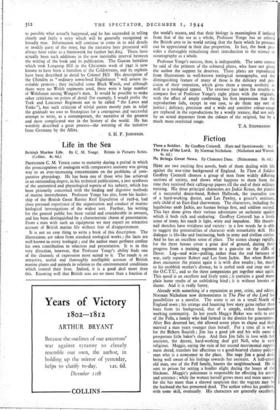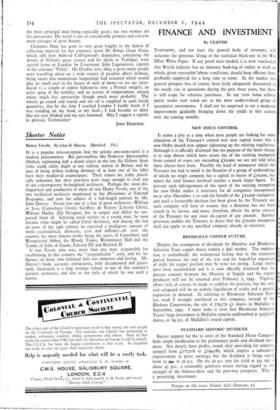Fiction
He Brings Great News. By Clemence Dane. (Heinemann. 8s. 6d.) HERE are tivo exciting first novels, both of them dealing with life against the war-time background of England. In Then A Soldier Geoffrey Cotterell chooses a group of men from widely differing sections of society, and shows what happens to them from the time they received their calling-up papers, till the end of their military training. His three principal characters_are Jackie Kraus, the pianist of a successful dance-band, Robert Halbrook, the journalist son of a hard-working doctor, and Les Pawley, a grocer's assistant, only child of an East-End charwoman. The characters, including the lugubrious snob Jackie, are human beings first, and soldiers second. This fact alone gives their various adventures an authentic quality which if both rich and endearing. Geoffrey Cotterell has a lively sense of irony, his touch is light, witty and impudent. His thumb- nail sketches have vividness and variety : in a few words he is able to suggest the potentialities of character with remarkable skilL His dialogue is life-like and fascinating, both in army and civilian circles. And he has an excellent sense of place. The scenes change rapidly, for the three heroes cover a great deal of ground, during their progress from a training regiment to a gun-site on the cliffs of Dover. Leg—and wire—pulling, rather than the real fortunes of war, early separate Robert and Les from Jackie. But when Robert does encounter the pianist again it is with dire results ; for, much to his snobbish mother's dismay, he is turfed neck and crop out of the 0.C.T.U., and so the three companions get together once again. This novel is an excellent and lively tonic ; it contains a good many plain home truths of an unblinking kind ; it is without heroics or shams. And it is really funny.
Already with something of a reputation as poet, critic, and editor, Norman Nicholson now demonstrates in The Fire of the Lord his possibilities as a novelist. The scene is set in a 'small North of England town ; his strange and haunting love story gains rather than loses from its background, that of a simple, rather humdrum working community. In her youth Maggie Birker was wife to one of the Fells, a family who had farmed- in the district for generations. After Ben deserted her, shb allowed seven years to elapse, and then married a man years younger than herself. For a' time all is well, for the Birkers flourish ; Jim has a good job and his wife owns a prosperous little baker's shop. And then Jim falls in love with her assistant, the decent, hard-working deaf girl Nell, who is very religious. Maggie, seeing the ruin of her second matrimonial experi- ment ahead, transfers her affections to a good-hearted clumsy police- man who is a newcomer to the place. She nags Jim a good deal, being well aware of his feelings towards her assistant. A half-crazy old man, one of the Fell family, haunts the neighbourhood. He is sent to prison for setting a bonfire alight during the hours of the blackout. Maggie's policeman is responsible for effecting his arrest and sentence; while the woman herself grows more and more uneasy, for she has more than a shrewd suspicion that the vagrant may be the husband she has presumed dead. The author solves his problem, with some skill, eventually. His characters are generally excellent,
the three principal men being especially good ; the two women are less persuasive. His novel is one of considerable promise and contains many passages of great beauty.
Clemente Dane has gone to very great lengths in the matter of collecting material for her romantic novel He Brings Great News, which tells how Adm.ral Collingwood's dispatches, containing the details of Nelson's great victory and his death at Trafalgar, were carried home to London by Lieutenant John Lapenotiere, captain of the schooner ' Pickle.' On October list, 1805, a great many people were travelling about on a wide variety of peculiar affairs without, being aware that momentous happenings had occurred which would play no small part in the future of each of them—so we are intro- duced to a couple of ardent balloonists (one a French emigre), an artist sprig of the nobility, and an actress of temperament, among others much less spectacular though much more probable. The wheels go round and round and the oil is supplied in such lavish quantities, that by the time I reached London I hardly knew if I was standing on my head, or my heels ; I had become so dizzy that my eyes blinked and my ears hummed. May I suggest a reprint in glorious Technicolor?
JOHN HAMPSON.



























 Previous page
Previous page